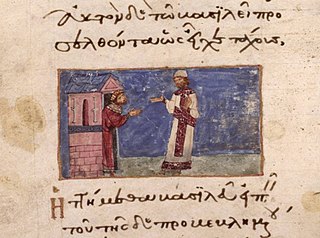Related Research Articles

Flavius Julius Constans, sometimes called Constans I, was Roman emperor from 337 to 350. He held the imperial rank of caesar from 333, and was the youngest son of Constantine the Great.

Marcus Clodius Pupienus Maximus was Roman emperor with Balbinus for 99 days in 238, during the Year of the Six Emperors. The sources for this period are scant, and thus knowledge of the emperor is limited. In most contemporary texts he is referred to by his cognomen "Maximus" rather than by his second nomen Pupienus.

A Roman governor was an official either elected or appointed to be the chief administrator of Roman law throughout one or more of the many provinces constituting the Roman Empire.

In the Late Roman Empire, usually dated 284 AD to 641 AD, the regional governance district known as the Roman or civil diocese was made up of a grouping of provinces each headed by a Vicarius, who were the representatives of praetorian prefects. There were initially twelve dioceses, rising to fourteen by the end of the 4th century.
Quintus Clodius Hermogenianus Olybrius was a Roman politician, praefectus urbi of Rome from 368 to 370 and Roman consul in 379. Olybrius has been characterized as belonging to "the breed of flexible politicians who did well both under Valentinian I [...] and under Gratian."
Gaius Ceionius Rufius Volusianus was a Roman senator who had a lengthy political career and who was appointed consul at least twice, the known dates being AD 311 and 314.
Lucius Petronius Taurus Volusianus was a Roman citizen, apparently of equestrian origins, whose career in the Imperial Service in the mid-Third Century AD carried him from a relatively modest station in life to the highest public offices and senatorial status in a very few years. He may have secured his first appointments before the Licinian Dynasty – – acceded to the Empire in 253 AD, but it was in the course of their reign that his upward progress achieved an almost unprecedented momentum and the second factor seems to have been a consequence of the first. The nature of his relationship to the Licinii is uncertain, but it seems likely that a common origin in the Etruscan region of central Italy at least predisposed Gallienus in his favour and he seems to have been that emperor's most trusted servant and adviser during the period of his sole reign - 260(?)-268 AD.
Valerius Maximus was a Roman senator.
Aconius CatullinussignoPhilomatius was a Roman senator who held high state offices under the emperor Constans.
Flavius Caesarius was a politician of the Eastern Roman Empire, who served under the emperors Theodosius I and Arcadius. Caesarius was magister officiorum (386-387), praetorian prefect of the East, and consul in 397.
Vulcacius Rufinus was a Roman politician, related to the Constantinian dynasty.

Domitius Modestus was a politician of the Roman Empire. He held appointments under the emperors Constantius II, Julian, and Valens, and was consul in 372. Previously a pagan, he converted to Arianism under Valens, and was sent by Valens to mediate between the Arian and Nicene factions with Basil of Caesarea.
Clearchus was a Roman politician who was consul of the Roman Empire in 384 AD.
Aristaenetus was a Roman politician who was appointed consul in AD 404 alongside the western emperor Honorius.
Claudius Antonius was a Roman politician under the reigns of Valentinian I, Gratian and Theodosius I. He was appointed consul in AD 382 alongside Afranius Syagrius.
Gaius Junius Donatus was a Roman politician, who was appointed consul twice, the second time in AD 260, during the Crisis of the Third Century.
Publius Cornelius Saecularis was a Roman politician who was appointed consul twice, first in around AD 240 and later in AD 260, during the Crisis of the Third Century.
Flavius Hypatius was a Roman Senator, who was the brother-in-law of the Roman emperor Constantius II.
Afranius Hannibalianus was the consul of 292 AD, a praetorian prefect, a senator and a military officer and commander.
Seleucus also known as Flavius Seleucus and Count Seleucus was a wealthy Greek rhetor who was a close friend of Libanius and the Roman emperor Julian.
References
- ↑ Arnheim, Michael T. W., The senatorial aristocracy in the later Roman empire (1972), pg. 76
- ↑ Potter, David Stone, The Roman Empire at Bay, AD 180-395 (2004), pg. 476
- ↑ Chenault, pg. 55
- ↑ Chenault, pgs. 54-55
- ↑ Story, pg. 239
- ↑ Story, pg. 243
- ↑ Martindale & Jones, pg. 510
- ↑ Barnes, Timothy David, Athanasius and Constantius: Theology and Politics in the Constantinian Empire (2001), pg. 292